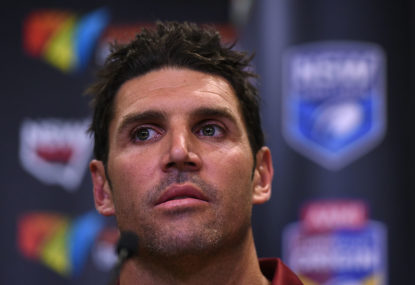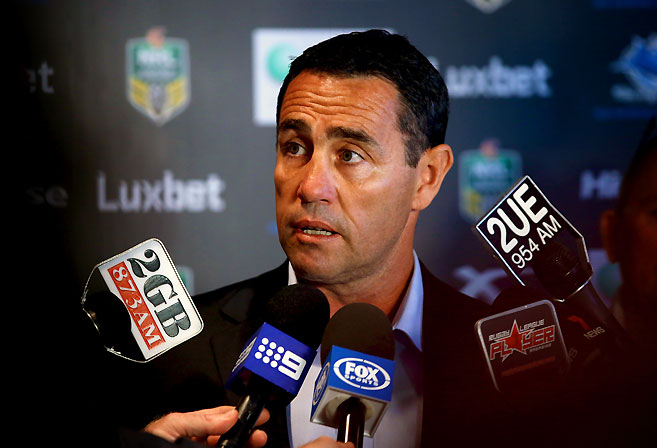A walk in the park: Super Sam shows Roosters what they've been missing in 60-point Anzac smash up
It might have been that simple all along. As much as the structures, coaching and roster come under pressure at the Roosters, the solution…

A rugby league game: with ten minutes to go, Team A is trailing Team B by four points.
Team A is pressing hard on Team B’s line. The ball is spread quickly out to the right wing. The final pass falls at the winger’s feet. He stoops to pick it up, skilfully gathers, and dives over the line, placing the ball just inside the touch-in-goal-line.
The referee wrongfully rules no try.
From the scrum, Team B’s first receiver drops the ball, Team A swoops on it, scores under the posts. Team A leads by two.
From the kick-off, Team A goes the length of the field and scores again. And again. Team A wins by 14.
A rugby league game: with ten minutes to go, Team A is trailing Team B by four points.
Team A is pressing hard on Team B’s line. The ball is spread quickly out to the right wing. The final pass falls at the winger’s feet. He stoops to pick it up, knocks it on, regathers and dives over the line, placing the ball on the touch-in-goal-line.
The referee wrongfully awards the try.
The conversion is kicked, Team A goes ahead by two. From the kick-off, Team A knocks the ball on. Team B scores from the ensuing scrum and now leads by four.
From the kick-off, Team B goes the length of the field and scores again. Team B wins by ten.
I’m sure you get the point: in the first example, Team A gets a bad call that ends up helping them. In the second example, Team B undergoes the same experience. There are millions of different ways that these things could’ve happened.
The point is not that it’s better for a team to receive bad decisions in a game. The point is that, as we discovered in Jurassic Park, chaos theory dictates that outcomes are unpredictable and when you put a drop of water on Laura Dern’s hand, you never know which way it’s going to roll.
When coaches, fans and players complain about officials’ decisions, they are assuming they know exactly where on Laura’s hand that drop is going to end up.
In an AFL game decided by one point, it’s assumed that a no-goal decision in the third quarter is crucial, by the premise that if that goal had been awarded, the losing team would’ve won by five – neglecting the fact that when that goal was turned down, it changed everything that happened from that point on.
That is: each decision does not simply make a difference to that moment, but to every subsequent moment. When a goal is kicked, the ball returns to the centre for a bounce. When a behind is kicked, the ball is kicked out from the goalsquare. When a free kick is given, the ball is disposed of from the spot of the infraction. Each of these results leads to different outcomes on the next play, and the next, and the next.
[latest_videos_strip category=”rugby-league” name=”League”]
It’s the same for any other sport: a correct or incorrect decision doesn’t have one consequence, it has hundreds, none of them possible to forecast at the time of the decision itself. And not just the big decisions on scoring. Every choice a referee or umpire makes flows on throughout the game.
You might think that the decision in the AFL elimination final to give Luke Shuey a free kick right on fulltime was an example of that rare decision that really does, unambiguously, decide the game.
And, of course, that’s true in one sense: if Shuey doesn’t get the free kick, he doesn’t kick the goal, and West Coast doesn’t win.
But what if the only reason Port Adelaide was ahead was because of a dodgy call earlier on? What if there was a free for hands in the back that should have been given in the first quarter, and because it wasn’t, West Coast didn’t finish the game ten goals in front, when if it had been, they would have?
We can’t know. We’ll never know.
This is not a call to ignore all errors by match officials. What we want is a game decided purely on the relative merits of the opposing teams, mixed, perhaps, with a dash of luck regarding the bounce of the ball. Every officiating error moves the game further away from that ideal – the precious match molecule decays a little bit further, until it becomes at last radioactive with incorrectness.

(AAP Image/Jane Dempster)
Obviously we want to minimise wrong decisions so as to make the game as pure and harmless as possible.
And I’m not going down that ‘hey, the players make mistakes too’ line either. Firstly, because the players’ mistakes are part of the above-mentioned purity – a player’s stuff-up is simply one measure of the relative merits, while a referee’s stuff-up is a distortion of the attempt to measure the relative merits.
Secondly, the skills of a player and the skills of a match official are completely different. Let’s not pretend that kicking a ball 50 metres to exactly the spot where you want it is the same as deciding whether someone’s hand hit someone in the face or not.
In general, my point is: don’t let the refs off the hook just on the grounds of them being only human. After all, brain surgeons are only human too, but we don’t let their mistakes slide. And most brain surgeries are far less important than a prelim.
No, I don’t want to see total acceptance of bad decisions any more than I want to see a lynch mob formed every time a ref misses a forward pass. All I want to see is the sporting community in general to stop pretending they know exactly what would have happened.
Trent Barrett saw his team denied a try when they were trailing 10-4, and the other team awarded a try when they were 10-10. In both circumstances, had the call gone the other way, the best-case scenario for Barrett would’ve been a score of 10-10 and god knows what might have happened from then on.
Yet he tells us those calls “cost us the season”? Get your hand off it.
In fact, that’s good advice for all the whingers. Get your hand off it, stop claiming psychic powers, admit that sport is chaos, and no matter how the ref rules, you just don’t know which way that water drop will roll.